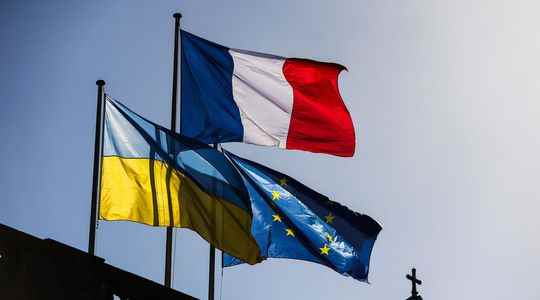By invading Ukraine, Vladimir Putin declared war on democracy, human rights and international law. He declared war on Europe, he declared war on us.
In flagrant violation of the United Nations Charter, international law and humanitarian law, its troops not only destroy Ukraine’s military infrastructure, but also bombard and kill civilians, women, children and the elderly. Hundreds of thousands of Ukrainians have taken refuge in Poland, Hungary, Moldova, or have fled the fighting. Moscow has dispatched Russian mercenaries from the sinister Wagner group, famous for its past abuses – looting, rape, murder – already in Ukraine, Libya, Mali and the Central African Republic in particular. The International Criminal Court has opened an investigation into war crimes and possible crimes against humanity committed by Russian forces, on the orders of Vladimir Putin.
And yet, the master of the Kremlin has already failed in his mad enterprise. No one supported his pathetic narrative calling for the “denazification” of a Ukraine “committing genocide in Donbass”. Tens of thousands of Russians brave the danger every day to proclaim their rejection of this unjustifiable aggression. They have courage in a country where opponents are imprisoned without trial, when they are not simply assassinated. They allow us to continue to hope for a Russia which, one day, no doubt, will once again become free and democratic. Putin united a Ukrainian nation that was still looking for itself and he transcended Volodymyr Zelensky into a patriot and warlord supported by an entire people.
Putin overestimated the Ukrainian people
It has caused a real revolution within the European Union, which is more united and determined than ever to defend its interests and its values. It realized in a few days that its economic, commercial and financial power had to be supplemented by technological and defense “strategic autonomy”. European defense is on the move today, in full cooperation with our partners and allies. The new Emperor of All Russia has resurrected the Atlantic Alliance, weakened by years of American indecision. He finally plunged his country, its economy and its people into an unprecedented political and economic isolation that will last for years. Sad record.
Cut off from the world, enclosed in a small inner circle of corrupt, complacent and fearful obligees, trusting only the security forces from which he came, Vladimir Putin overestimated his strength and underestimated the will and the capacity for resistance of the Ukrainian people. And the rest of the world. Kiev may be taken tomorrow, a puppet may be installed in power, it is already too late for the Russian dictator. Ukraine will survive, Ukraine will live. And she turns to us, she asks to join the European Union, symbol in her eyes of freedom, prosperity and security. We must respond to him, we must respond positively to his request.
Admittedly, Ukraine today is devastated by war, but it is not at war, it is the victim of an aggression which it is resisting with incredible courage. Let us remember that in 2003, Europe welcomed into its midst, among others, the Republic of Cyprus whose territory had been partially occupied since 1974 by the Turkish army. At the same time, it is a large part of the countries of the “other Europe” that we have welcomed. Their economies were not ready, their democracies in their infancy. Today, they are essential partners of our European Union, united in the same desire to defend our achievements in the face of totalitarian regimes which call into question the order of the world and the multilateral system, with the United Nations in its center.
The concrete membership process will take time
The Ukrainians’ European commitment is indisputable, they proved it in 2014: the “Orange Revolution” and then the events in Maidan Square attest to this. The people took to the streets en masse to drive out a president who, yielding to pressure from Moscow, had given up on asking for Ukraine to join the European Union. He paid the price, losing Crimea and Sevastopol, forcibly annexed by Russia, and suffering a Kremlin-triggered civil war in Donbass. Like the Georgians, also cut off from provinces de facto annexed by Russia since 2008.
We must hear Ukrainians’ calls for help. We must very significantly increase the economic, financial and humanitarian support that we are currently providing to them. But we must also support them politically and in the long term, by welcoming them among us, and on an equal basis as President Zelensky has requested. Ukraine’s concrete accession process will undoubtedly take time. But opening this process today, recognizing that the Ukrainians already respect European democratic values and universal human rights, enshrined in the United Nations Charter and the Universal Declaration of Human Rights, is to recognize their right to the existence that, precisely, Vladimir Putin denies them.
Let’s open the European Union to Ukraine. Now. Their future is at stake, but also ours: if we close the door to them at one of the most serious moments in their history, in the face of an unjustifiable, illegal, murderous aggression, we will not be worthy of ours.
